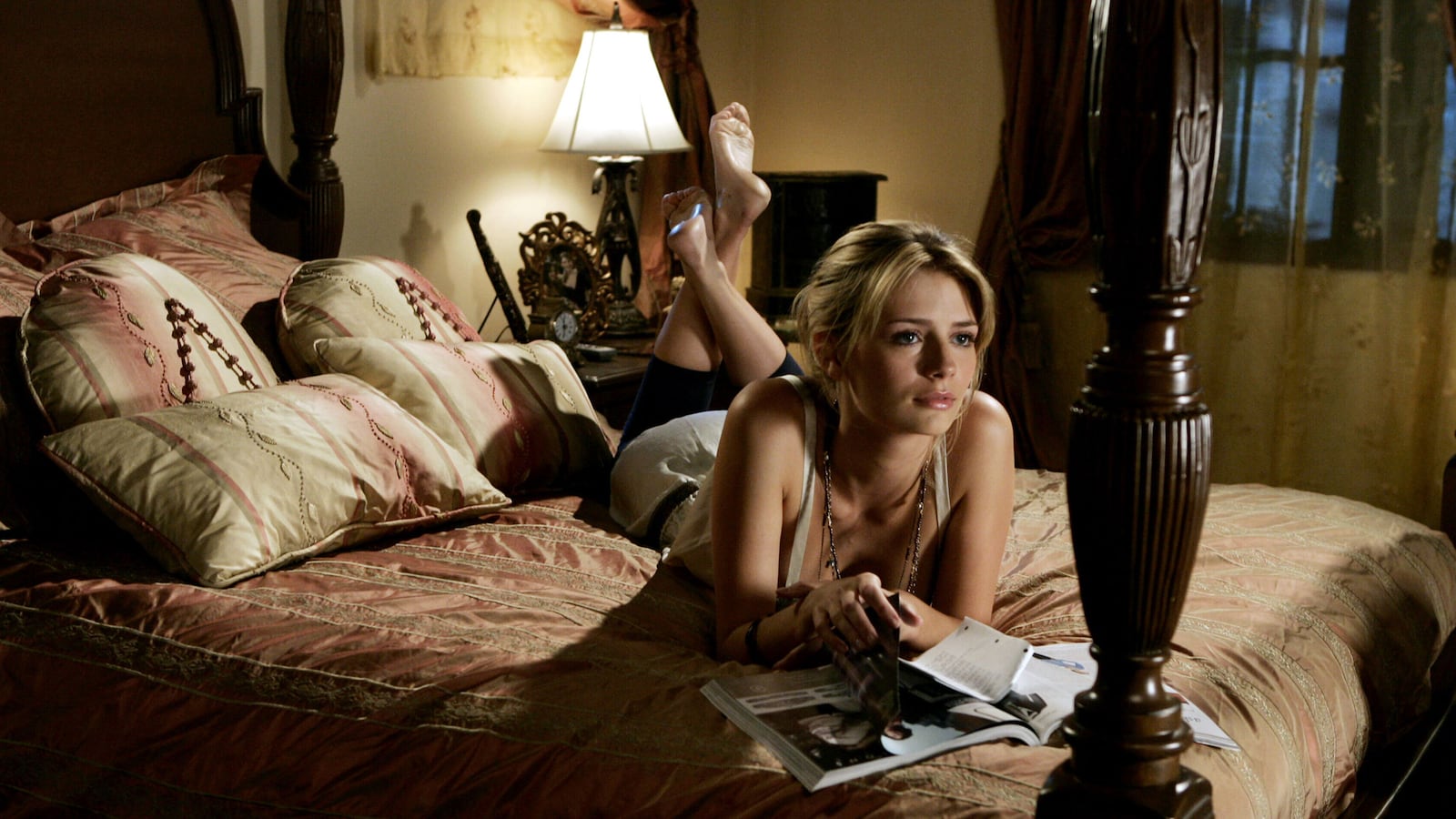Since its series finale in 2007, The O.C. remains the type of legendary drama that begets constant conversation about its eccentric characters and wild plotlines—including from its own cast. In 2021, two of The O.C.’s stars, Melinda Clarke (who played Julie Cooper) and Rachel Bilson (Summer Roberts), launched the popular podcast Welcome to the O.C., Bitches!, where they revisit all 92 episodes alongside former castmates, crew members, and celebrity superfans.
One can easily assume that Bilson and Clarke’s championing of the series all these years later helped pave the way for a new book, Welcome To The O.C.: The Oral History, out Nov. 28, that also coincides with the show’s 20th anniversary. Written by Rolling Stone’s chief television critic Alan Sepinwall, in conversation with The O.C.’s creator Josh Schwartz and executive producer Stephanie Savage, it’s the sort of amusingly honest tell-all book that could only come after years of self-reflection, healed wounds, and a sense of appreciation from everyone involved with the hit show.
According to Schwartz—whom I recently spoke to over Zoom alongside Savage and Sepinwall—Bilson and Cooper’s podcast helped him and other sources in Welcome To The O.C. feel more comfortable discussing the relatively short-lived cultural phenomenon and everything that went wrong with it.

Stephanie Savage and Josh Schwartz.
Maarten De Boer/Getty Images“We joked that it was sort of like group therapy that we were all having individually,” he said. “I’m not sure we would have felt as confident about everybody coming back to this subject and talking about it if it hadn’t been for seeing so many people—ourselves included—go on the podcast.”
“Rachel and Melinda’s podcast really gave everyone an opportunity to kind of do a first round of lookback thoughts on the show, and share those publicly and get some feedback,” Savage added.
Creative partners Schwartz and Savage were approached by literary agent Jessica Spitz, who happens to be the daughter of one of their agents as well as a big O.C.-head. When it came to deciding who was knowledgeable and fanatical enough about the series to put their collective stories on paper, Sepinwall—who wrote the 2004 book Stop Being A Hater and Learn To Love The O.C.—was the pair’s “top choice.” Sepinwall was expectedly game.
“One of the things they made clear to me when they first did the outreach was they wanted this to be a warts-and-all portrait,” Sepinwall said. “And I feel like that comes across in the final work. Everyone was sort of remarkably candid with us. And Josh and Stephanie definitely set the tone for that.”
Over roughly six months, Sepinwall and his researcher Oriana Schwindt tracked down a number of crucial players in The O.C.’s history, including all of the regular cast, executive producer McG, Fox and Warner Bros. executives, guest stars, musicians, and die-hard fans like comedian Paul Scheer. Still, not everyone Sepinwall reached out to was able to partake in this epic story. His white whales included unassuming guest stars who went on to have huge Hollywood careers, like Chris Pratt, who played student activist Ché Cook in Season 4.
“He is—you might be surprised to learn—somewhat busy,” Sepinwall quipped. “We wanted to talk to Olivia Wilde. But the entire reporting of the book was happening as the Don’t Worry Darling press tour was unfolding. And so that was not really an ideal time to reach out to her. And I really wanted to talk to one of the guys from [the band] Rooney. And that never quite happened either.”
The result of all these stories is something that feels like it could easily be adapted for the big screen—that is, if Hollywood was equally interested in how iconic television is made as famous blockbusters. In the role of the story’s “tortured genius” protagonist, you have the naive but industrious Schwartz. When The O.C. premiered in 2003, he was the youngest creator of an hour-long television show at 26 years old. Savage, who had produced the short-lived Fox series Fastlane, was more experienced and would adopt the role of a wiser, protective older sister to Schwartz. In an early chapter of the book, she recalls being cautious during the process of hiring a showrunner, fearing they would attempt to overthrow her younger producing partner.
While The O.C. quickly found an audience, both Schwartz and Savage were navigating unprecedented publicity, network demands, and complicated relationships with the cast. Both were around the same age as the twentysomething actors who were playing the show’s teenagers, and the line between friend and subordinate was often blurred. At the same time, Schwartz was young, new to the field, and operating in full people-pleaser mode. In Welcome To The O.C., he says that he wrote Bilson’s character, Summer, into Season 1’s Las Vegas episode because she wanted to keep an eye on her then-boyfriend, Adam Brody. Schwartz also found himself caving to the requests and opinions of the show’s veteran actor, Peter Gallagher.
“I wanted to make everyone happy, kind of to a fault,” Schwartz said.
By Season 3, Schwartz went from mingling with the lead cast on and off set to being completely absent from the shoot.
“When people weren’t happy, that became harder,” he admitted. “And that actually should have been an opportunity for me to reach out to collaborate more. And instead, I kind of went the other way.”
Outside of the interpersonal dynamics on set, Welcome To The O.C. paints a compelling portrait of the competitive landscape of network television in the early aughts, before streaming fractured everyone’s media consumption. In 2023, it’s hard to imagine a Netflix program having to scrap a storyline because another show on Hulu already did it. In the case of The O.C., however, Schwartz, Savage, and the writers room had to avoid other plot points that were playing out on rival primetime soaps, most notably ABC’s Desperate Housewives.
Production was also constantly receiving memos from higher-ups threatening to cancel the show if they couldn’t deliver Season 1’s early ratings, which obviously generated more stress. The most daunting note came during the third season, when viewership noticeably started to decline. Fox wanted more “promotable” storylines that they could advertise in commercials during hit primetime programs like American Idol, or else they would cut the cord. The result: the show’s lead female protagonist Marissa Cooper (Mischa Barton) dying in a drunk-driving accident.
There was also just more work, given that network seasons are usually much longer than the eight or 10-episode order of most streaming shows. Likewise, it’s become a joke between me and my older sister that O.C. plotlines we thought happened in Season 2 or 3 actually occurred in Season 1, which had a whopping 27 episodes. The breakneck speed at which the plot moved along is also a likely cause for this confusion. The O.C., like many network programs, was truly episodic in that characters experienced major life changes, personal tragedies, and new relationships almost every week.
Marissa, the show’s sad rich girl, would also be the biggest victim of this storyline burnout, as evidenced by her random death. A recurring anecdote throughout the oral history is how difficult it was for the writers to find interesting directions for her perpetually lost character. Savage and Schwartz take partial responsibility for not being creative enough with Marissa’s arc, while also acknowledging that the network was never satisfied with their ideas for her.
“Some of it is the failure of our own imaginations,” Savage said. “And then some of it was external forces. For example, we thought that her relationship with Alex [Wilde] had a lot of potential. And that was kind of a story that there was some outside pressure on us to wrap up more quickly than if we had been left to our own devices.”
“I think it was less about defining the character and more about sometimes letting some of these relationships define the character,” Schwartz added. “There’s only so many times you can break up Marissa and Ryan and put them back together and then throw a new obstacle in. It’s a challenge for these kinds of shows.”

Benjamin McKenzie and Mischa Barton.
©Warner Bros/Courtesy Everett CollectionThe cancellation of The O.C. after Season 4 certainly didn’t slow Schwartz and Savage down, though. Since their days at Fox, the two have remained powerbrokers in the world of teen soaps, both in streaming and on network TV. While Schwartz is largely known as the wunderkind who made The O.C., he and Savage have also brought hit shows like Gossip Girl (the original and the Max reboot), The Carrie Diaries, Hart of Dixie, the Dynasty remake, and The CW’s Nancy Drew to the small screen. When it comes to streaming, though, the producers agree that the lack of an immediate response from an audience can be isolating and create a sense of uncertainty.
“When we started transitioning into streaming, there was a sense of relief that you weren’t living and dying by the ratings, as you’re used to,” Schwartz said. “That being said, there’s so much stuff that comes out, and it’s hard to measure what’s breaking through and what’s not. There’s a trade-off. You’re not living or dying by the ratings thing anymore, which is a relief. But then you’re also not sure if anyone’s even watching your show.”
“You’ve lost that giant marketing machine,” Savage chimed in. “That sense of seeing your show on the side of a bus, knowing that 12 million people watched your show last night—that’s gone away. And you’re a little bit more in a very quiet, little bubble of hoping that people are watching your show and enjoying it without all that feedback.”
One recent project of theirs that received an unavoidable amount of feedback was the critically panned (and now-canceled) Gossip Girl reboot, which premiered in 2021. The fact that Schwartz and Savage would even agree to remake arguably their most successful program, aside from The O.C., is surprising. In the oral history, the pair are much more precious about potentially resurrecting and adapting The O.C. for a Gen Z audience.
Schwartz said returning to Gossip Girl felt like a safer bet simply because it had a more viable premise. Or so they thought.
“Gossip Girl felt like it had a more franchisable concept,” he said. “You had an omniscient online presence that was monitoring and derailing the lives of these characters that everybody was kind of living for, and who was behind this? You could take that concept and potentially reapply it to a new generation of students. The O.C. felt more kind of singularly driven by this one particular story.”

Adam Brody, Rachel Bilson, Mischa Barton, and Benjamin McKenzie
©Warner Bros/Courtesy Everett CollectionSchwartz added that he and Savage have “made their peace with the legacy of the show.” However, given the clear interest in The O.C. 20 years later, I couldn’t help but wonder if that was a definite no to the possibility of a reboot.
“Kind of,” he answered after a long pause. “I mean, if at some point, some young buck comes up to us and pitches a new version of the show that could work for us… but new stories and new characters are kind of what’s beckoning to us.”
Savage agreed, adding that the show’s popularity on streaming brings her enough satisfaction. When I asked if watching the positive reception to the show all these years later creates any bittersweet feelings, Schwartz swiftly assured, “We’ve got nothing but gratitude.”






